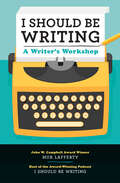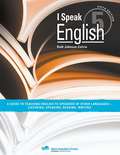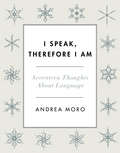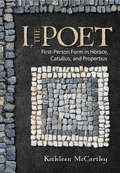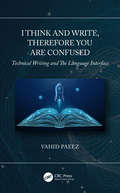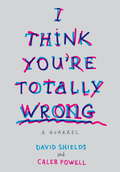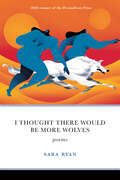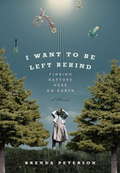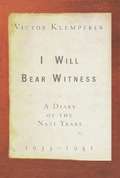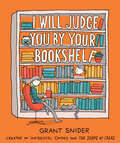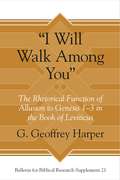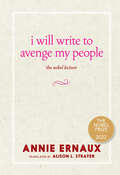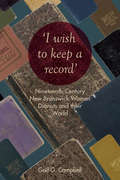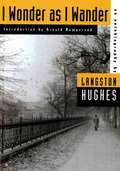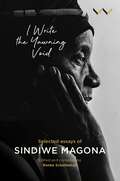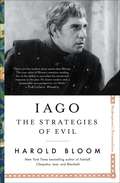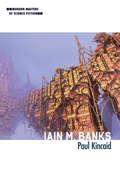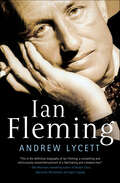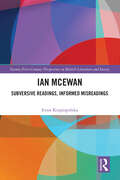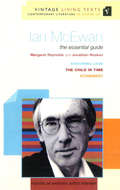- Table View
- List View
I See
by Liza Bennett Cindy Peattie Diane Le FeyerTitle contained within StartUp Phonic Core Program. Not Sold Separately
I See Nat
by Lei Ling Cindy Peattie Rick PetersonTitle contained within StartUp Phonic Core Program. Not Sold Separately
I Should Be Writing: A Writer's Workshop
by Mur Lafferty“Equal parts motivation and inspiration . . . Bite-size, easy-to-read chapters coach new writers through everything from imposter syndrome to writer’s block.” —The WriterI Should Be Writing is everything you’d hope to find in a writing workshop, condensed into one highly effective journal. It’s time to stop dreaming about what you want to write and finally do it!Let award-winning podcaster Mur Lafferty, who in the past has interviewed authors including John Scalzi, Neil Gaiman, Gail Carriger, Adam Christopher, and Kameron Hurley, guide you through the nuts-and-bolts process of honing your craft, including which writing myths to ignore, how to refine your creative process, listening to your inner muse while ignoring your inner bully, and more. This book also contains writing exercises that will help the blossoming writer strengthen the writer’s muscle of writing every day. These include everything from situational writer’s prompts to lists of ideas writers should try to jot down between writing sessions.With this helpful guide, you can make the phrase, “I’ve always wanted to write a story . . .” a thing of the past. Because you should be writing!
I Speak English
by Ruth Johnson ColvinThis book of basic professionally accepted techniques and principles is written for those who wish to help people with limited or no English language skills to communicate in English. Detailed instructions are provided for teaching English one-to-one, in small groups, or in classroom settings. By applying the simplified methods described here, volunteers with no teaching experience will be able to tutor effectively. The book will also be useful to paraprofessionals and professional teachers.
I Speak, Therefore I Am: Seventeen Thoughts About Language
by Andrea MoroThere are no men so dull and stupid, not even idiots, as to be incapable of joining together different words, and thereby constructing a declaration by which to make their thoughts understood.... On the other hand, there is no other animal, however perfect or happily circumstanced which can do the like.—DescartesLanguage is more like a snowflake than a giraffe's neck. Its specific properties are determined by laws of nature, they have not developed through the accumulation of historical accidents.—Noam ChomskyIn I Speak, Therefore I Am, the Italian linguist and neuroscientist Andrea Moro composes an album of his favorite quotations from the history of linguistics, beginning with the Book of Genesis and the power of naming and concluding with Noam Chomsky's metaphor that language is a snowflake. Moro's seventeen linguistic thoughts and his commentary on them display the humanness of language: our need to name and interpret this world and create imaginary ones, to express and understand ourselves. This book is sure to delight anyone who enjoys the ineffable paradox that is human language.
I, the Poet: First-Person Form in Horace, Catullus, and Propertius
by Kathleen McCarthyFirst-person poetry is a familiar genre in Latin literature. Propertius, Catullus, and Horace deployed the first-person speaker in a variety of ways that either bolster or undermine the link between this figure and the poet himself. In I, the Poet, Kathleen McCarthy offers a new approach to understanding the ubiquitous use of a first-person voice in Augustan-age poetry, taking on several of the central debates in the field of Latin literary studies—including the inheritance of the Greek tradition, the shift from oral performance to written collections, and the status of the poetic "I-voice."In light of her own experience as a twenty-first century reader, for whom Latin poetry is meaningful across a great gulf of linguistic, cultural, and historical distances, McCarthy positions these poets as the self-conscious readers of and heirs to a long tradition of Greek poetry, which prompted them to explore radical forms of communication through the poetic form. Informed in part by the "New Lyric Studies," I, the Poet will appeal not only to scholars of Latin literature but to readers across a range of literary studies who seek to understand the Roman contexts which shaped canonical poetic genres.
I Think and Write, Therefore You Are Confused: Tehnical Writing and The Language Interface
by Vahid PaeezThe importance of good documentation can build a strong foundation for any thriving organization. This reference text provides a detailed and practical treatment of technical writing in an easy to understand manner. The text covers important topics including neuro-linguistics programming (NLP), experimental writing against technical writing, writing and unity of effect, five elements of communication process, human information processing, nonverbal communication and types of technical manuals. Aimed at professionals and graduate students working in the fields of ergonomics, aerospace engineering, aviation industry, and human factors, this book: Provides a detailed and practical treatment of technical writing. Discusses several personal anecdotes that serve as real-work examples. Explores communications techniques in a way that considers the psychology of what "works" Discusses in an easy to understand language, stories, and examples, the correct steps to create technical documents.
I Think You're Totally Wrong
by David Shields Caleb PowellAn impassioned, funny, probing, fiercely inconclusive, nearly-to-the-death debate about life and art--beers included.Caleb Powell always wanted to become an artist, but he overcommitted to life (he's a stay-at-home dad to three young girls), whereas his former professor David Shields always wanted to become a human being, but he overcommitted to art (he has five books coming out in the next year and a half). Shields and Powell spend four days together at a cabin in the Cascade Mountains, playing chess, shooting hoops, hiking to lakes and an abandoned mine; they rewatch My Dinner with André and The Trip, relax in a hot tub, and talk about everything they can think of in the name of exploring and debating their central question (life and/or art?): marriage, family, sports, sex, happiness, drugs, death, betrayal--and, of course, writers and writing.The relationship--the balance of power--between Shields and Powell is in constant flux, as two egos try to undermine each other, two personalities overlap and collapse. This book seeks to deconstruct the Q&A format, which has roots as deep as Plato and Socrates and as wide as Laurel and Hardy, Beckett's Didi and Gogo, and Car Talk's Magliozzi brothers. I Think You're Totally Wrong also seeks to confound, as much as possible, the divisions between "reality" and "fiction," between "life" and "art." There are no teachers or students here, no interviewers or interviewees, no masters in the universe--only a chasm of uncertainty, in a dialogue that remains dazzlingly provocative and entertaining from start to finish.James Franco's adaptation of I Think You're Totally Wrong into a film, with Shields and Powell striving mightily to play themselves and Franco in a supporting role, will be released later this year. From the Hardcover edition.
I Thought There Would Be More Wolves: Poems (Permafrost Prize Series)
by Sara RyanAfter moving to the Upper Peninsula of Michigan, poet Sara Ryan found herself immersed in the isolated spaces of the North: the cold places that never thawed, the bleak expanses of snow. These poems have teeth, bones, and blood—they clack and bruise and make loud sounds. They interrogate self-preservation, familial history, extinction, taxidermy, and animal and female bodies. In between these lines, in warm places where blood collects, animals stay hidden and hunted, a girl looks loneliness dead in the eye, and wolves come out of the woods to run across the frozen water of Lake Superior.
I Unpacked My Grandmother's Trunk
by Susan Ramsay Hoguet"I unpacked my Grandmother's trunk and out of it I took ..." objects beginning with the letters from A to Z. A delightful book for young children, who will love the repetition. This file should make an excellent embossed braille copy.
I Want To Be Left Behind: Finding Rapture Here on Earth
by Brenda PetersonGrowing up between Baptist Endtimers and apocalyptic Greensua rollicking tale of survival
I Will Bear Witness: A Diary of the Nazi Years, 1933-1941
by Victor Klemperer Martin ChalmersI Will Bear Witness is a work of literature as well as a revelation of the day-by-day horror of the Nazi years. Victor Klemperer's secret diaries brings to light one of the most extraordinary documents of the Nazi period.
I Will Judge You by Your Bookshelf
by Grant SniderA look at the culture and fanaticism of book lovers, from the beloved New York Times illustrator and creator of Incidental Comics. It’s no secret, but we are judged by our bookshelves. We learn to read at an early age, and as we grow older we shed our beloved books for new ones. But some of us surround ourselves with books. We collect them, decorate with them, are inspired by them, and treat our books as sacred objects. In this lighthearted collection of one- and two-page comics, writer-artist Grant Snider explores bookishness in all its forms, and the love of writing and reading, building on the beloved literary comics featured on his website, Incidental Comics. I Will Judge You by Your Bookshelf is the perfect gift for bookworms of all ages.“This playful, self-aware collection of strips and gags on the joys and frustrations of reading and writing is equal parts lighthearted and sincere . . . The panels range from gently clever to surprisingly profound to laugh-out-loud.” —Publishers Weekly“A prescient book for these times.” —Newsarama
“I Will Walk Among You”: The Rhetorical Function of Allusion to Genesis 1–3 in the Book of Leviticus (Bulletin for Biblical Research Supplement #21)
by G. Geoffrey HarperThe well-known parallels between Genesis and Leviticus invite further reflection, particularly in regard to the rhetorical and theological purpose of their lexical, syntactical, and conceptual correspondences. This volume investigates the possibility that the final-form text of Leviticus is an indirect reference to Genesis 1–3 and examines the rhetorical significance of such an allusion.The face of Pentateuch scholarship has shifted dramatically in the last forty years, resulting in the questioning of many received truths and the employment of a host of new, renewed, and often competing methodologies by biblical scholars. This study sits at the intersection of these recent interpretive trends. G. Geoffrey Harper uses insights from the fields of intertextuality, rhetorical criticism, and speech act theory to create a methodological framework, which he applies to three Leviticus pericopes. Chapters 11, 16, and 26 are examined in turn, and for each the assessment of potential parallels at lexical, syntactical, and conceptual levels reveals a complex web of interconnected allusion to the creation and Eden narratives of Genesis 1 and 2–3. Moreover, Harper probes the theological and rhetorical import of these intertextual connections and explores how Leviticus ought to be understood in its Pentateuchal context.This comprehensive study of the connections between these two sections of the Hebrew Bible sheds light on both the literary artistry of these ancient texts and the persuasive purposes that lie behind their composition.
“I Will Walk Among You”: The Rhetorical Function of Allusion to Genesis 1–3 in the Book of Leviticus (Bulletin for Biblical Research Supplement)
by G. Geoffrey HarperThe well-known parallels between Genesis and Leviticus invite further reflection, particularly in regard to the rhetorical and theological purpose of their lexical, syntactical, and conceptual correspondences. This volume investigates the possibility that the final-form text of Leviticus is an indirect reference to Genesis 1–3 and examines the rhetorical significance of such an allusion.The face of Pentateuch scholarship has shifted dramatically in the last forty years, resulting in the questioning of many received truths and the employment of a host of new, renewed, and often competing methodologies by biblical scholars. This study sits at the intersection of these recent interpretive trends. G. Geoffrey Harper uses insights from the fields of intertextuality, rhetorical criticism, and speech act theory to create a methodological framework, which he applies to three Leviticus pericopes. Chapters 11, 16, and 26 are examined in turn, and for each the assessment of potential parallels at lexical, syntactical, and conceptual levels reveals a complex web of interconnected allusion to the creation and Eden narratives of Genesis 1 and 2–3. Moreover, Harper probes the theological and rhetorical import of these intertextual connections and explores how Leviticus ought to be understood in its Pentateuchal context.This comprehensive study of the connections between these two sections of the Hebrew Bible sheds light on both the literary artistry of these ancient texts and the persuasive purposes that lie behind their composition.
I Will Write to Avenge My People: The Nobel Lecture
by Annie ErnauxPublished for the first time in a beautiful collectible edition, the essential lecture delivered by the 2022 recipient of the Nobel Prize in Literature, Annie Ernaux.«J&’écrirai por venger ma race»It was as a young woman that Annie Ernaux first wrote these words in her diary, giving a name to her purpose in life as a writer. She returns to them in her stirring defense of literature and of political writing in her Nobel Lecture, delivered in Stockholm on December 7, 2022.To write of her own life, she asserts, is to &“shatter the loneliness of experiences endured and repressed;&” to mine individual experience is to find collective emancipation. Ernaux&’s speech is a bold assertion of the capacity of writing to give people a sense of their own worth, and of one writer&’s commitment to bearing witness to life, its joys and its injustices.Includes Annie Ernaux's Nobel lecture, her Nobel banquet speech, a congratulatory speech by Professor Anders Olsson, Chair of the Nobel Committee for Literature, and the Nobel opening address by Professor Carl-Henrik Heldin, Chairman of the board of the Nobel Foundation.
"I wish to keep a record": Nineteenth-Century New Brunswick Women Diarists and Their World
by Gail CampbellNineteenth-century New Brunswick society was dominated by white, Protestant, Anglophone men. Yet, during this time of state formation in Canada, women increasingly helped to define and shape a provincial outlook. I wish to keep a record is the first book to focus exclusively on the life-course experiences of nineteenth-century New Brunswick women. Gail G. Campbell offers an interpretive scholarly analysis of 28 women’s diaries while enticing readers to listen to the voices of the diarists. Their diaries show women constructing themselves as individuals, assuming their essential place in building families and communities, and shaping their society by directing its outward gaze and envisioning its future. Campbell’s lively analysis calls on scholars to distinguish between immigrant and native-born women and to move beyond present-day conceptions of such women’s world. This unique study provides a framework for developing an understanding of women's worlds in nineteenth-century North America.
I Wonder As I Wander
by Langston HughesLangston Hughes vividly recalls the most dramatic and intimate moments of his life in the turbulent 1930s. His wanderlust leads him to Cuba, Haiti, Russia, Soviet Central Asia, Japan, Spain (during its Civil War), through dictatorships, wars, revolutions. He meets and brings to life the famous and the humble, from Arthur Koestler to Emma, the Black Mammy of Moscow. It is the continuously amusing, wise revelation of an American writer journeying around the often strange and always exciting world he loves.
I Write the Yawning Void: Selected essays of Sindiwe Magona
by Sindiwe MagonaSindiwe Magona is a celebrated South African writer, storyteller and motivational speaker known mainly for her autobiographies, biographies, novels, short stories, poetry and children’s books. I Write the Yawning Void is a collection of essays that highlight her engagement with writing that span the transition from apartheid to the post-apartheid period and addresses themes such as HIV/Aids, language and culture, home and belonging. Magona worked as a teacher, domestic worker and spent two decades working for the United Nations in the United States of America. She has received many awards for her fierce and fearless writing ‘truth to power’. Her written work is often informed by her lived experience of being a black woman resisting subjugation and poverty. These essays bring to life many facets of Magona’s personal history as well as her deepest convictions, her love for her country and despair at the problems that continue to plague it, and her belief in her ability to activate change. They demonstrate Magona’s engaging storytelling and mastery of the essay form which serve as meaningful supplements to her fictional works, while simultaneously offering direct and insightful responses to the conditions that inspired them. Through her essays Magona offers a reimagining of a broken society and the role literature can play in casting new light on old wounds.
Iago: The Strategies of Evil (Shakespeare's Personalities #4)
by Harold BloomFrom one of the greatest Shakespeare scholars of our time, Harold Bloom presents Othello&’s Iago, perhaps the Bard&’s most compelling villain—the fourth in a series of five short books about the great playwright&’s most significant personalities.Few antagonists in all of literature have displayed the ruthless cunning and deceit of Iago. Denied the promotion he believes he deserves, Iago takes vengeance on Othello and destroys him. One of William Shakespeare&’s most provocative and culturally relevant plays, Othello is widely studied for its complex and enduring themes of race and racism, love, trust, betrayal, and repentance. It remains widely performed across professional and community theatre alike and has been the source for many film and literary adaptations. Now award-winning writer and beloved professor Harold Bloom investigates Iago&’s motives and unthinkable actions with razor-sharp insight, agility, and compassion. Why and how does Iago use lies and deception—the fake news of the 15th century—to destroy Othello and several other characters in his path? What can Othello tell us about racism? Bloom is mesmerizing in the classroom, treating Shakespeare&’s characters like people he has known all his life. He delivers exhilarating intimacy and clarity in these pages, writing about his shifting understanding—over the course of his own lifetime—of this endlessly compelling figure, so that Iago also becomes an extraordinarily moving argument for literature as a path to and a measure of our humanity. &“There are few readers more astute than Bloom&” (Publishers Weekly), and his Iago is a provocative study for our time.
Iain M. Banks (Modern Masters of Science Fiction)
by Paul KincaidThe 1987 publication of Iain M. Banks's Consider Phlebas helped trigger the British renaissance of radical hard science fiction and influenced a generation of New Space Opera masters. The thirteen SF novels that followed inspired an avid fandom and intense intellectual engagement while Banks's mainstream books vaulted him to the top of the Scottish literary scene. Paul Kincaid has written the first study of Iain M. Banks to explore the confluence of his SF and literary techniques and sensibilities. As Kincaid shows, the two powerful aspects of Banks's work flowed into each other, blurring a line that critics too often treat as clear-cut. Banks's gift for black humor and a honed skepticism regarding politics and religion found expression even as he orchestrated the vast, galaxy-spanning vistas in his novels of the Culture. In examining Banks's entire SF oeuvre, Kincaid unlocks the set of ideas Banks drew upon, ideas that spoke to an unusually varied readership that praised him as a visionary and reveled in the distinctive character of his works. Entertaining and broad in scope, Iain M. Banks offers new insights on one of the most admired figures in contemporary science fiction.
Iambic Poetics in the Roman Empire
by Tom HawkinsThis is the first book to study the impact of invective poetics associated with early Greek iambic poetry on Roman imperial authors and audiences. It demonstrates how authors as varied as Ovid and Gregory Nazianzen wove recognizable elements of the iambic tradition (e. g. meter, motifs, or poetic biographies) into other literary forms (e. g. elegy, oratorical prose, anthologies of fables), and it shows that the humorous, scurrilous, efficacious aggression of Archilochus continued to facilitate negotiations of power and social relations long after Horace's Epodes. The eclectic approach encompasses Greek and Latin, prose and poetry, and exploratory interludes appended to each chapter help to open four centuries of later classical literature to wider debates about the function, propriety and value of the lowest and most debated poetic form from archaic Greece. Each chapter presents a unique variation on how these imperial authors became Archilochus – however briefly and to whatever end.
Ian Fleming
by Andrew LycettWe all know who James Bond is, but how many of us know much about his creator, Ian Fleming, a master of espionage and thrillers? In this full-length biography, author Andrew Lycett tells the story of Ian Fleming's life proving that it was just as dramatic as that of his fictional creation. Educated at Eaton and Sandhurst, he joined Naval Intelligence in 1939 participating in both Operation Mincemeat and Operation Golden Eye. After the war, he became a journalist and, in 1953, wrote Casino Royale thereby introducing the world to an English spy named James Bond. Set in London, Switzerland and Fleming's Jamaican estate Goldeneye, his life was peopled with luminaries like Noel Coward, Sean Connery, Ursula Andress, Bond film producer "Cubby" Broccoli and others. With direct access to Fleming's family and friends, Lycett goes behind the complicated façade of this enigmatic and remarkable man. Ian Fleming by Andrew Lycett is biography at its best—a glittering portrait of the brilliant and enigmatic man who created Agent 007.
Ian McEwan: Subversive Readings, Informed Misreadings (21st Century Perspectives on British Literature and Society)
by Irena KsiężopolskaThis book offers a discussion of seven “canonical” novels by Ian McEwan (The Cement Garden, The Comfort of Strangers, The Child in Time, The Innocent, Black Dogs, Atonement, On Chesil Beach), introducing radical new readings, which are offered not as ultimate and conclusive “solutions” of the textual puzzles, but as possibilities to engage with the text creatively, to enrich the critical consensus and restore interpretative freedom to the readers. This project formulates a strategy of “inclusive reading” – an approach to the text that does not seek to reduce it to a single interpretation, and yet is comprehensively informed through the analysis of the primary text, critical discussion, authorial comments and the context of the composition. Each reading demonstrates the metafictional structure of the texts, indicating that McEwan’s works may be treated as invitations to roam within their worlds, examining the multiple frames of their structure and the meanings generated thereby. All the chapters attend to submerged, repressed, or deliberately masked voices. The Cement Garden is seen as a multi-layered dream, with a shifting hierarchy of dreamers; The Comfort of Strangers is viewed as an inverted metafiction, with insubstantial characters corrupting more complex heroes; The Child in Time is read as Stephen’s book written for his dead daughter; The Innocent as a memory narrative of Leonard who refuses to notice Maria’s role as a spy. In Black Dogs the over-exposure of unreliability is studied as a screen for personal trauma; in the analysis of Atonement Briony’s claim to authorship is questioned and Cecilia is suggested as an alternative narrative agent. Finally, examining On Chesil Beach, both characters’ voices are reconstructed in search of the superior narrative power, which in the end is seen to be elusive, as the text seeks to undermine the hierarchy of voices.
Ian McEwan: The Essential Guide (Vintage Living Texts #16)
by Jonathan Noakes Margaret ReynoldsIn Vintage Living Texts teachers and students will find the essential guide to the works of Ian McEwan. This guide will deal with his themes, genre and narrative technique, and a close reading of the texts will be accompanied with likely exam questions, and contexts and comparisons - as well as providing a rich source of ideas for intelligent and inventive ways of approaching the novels.

